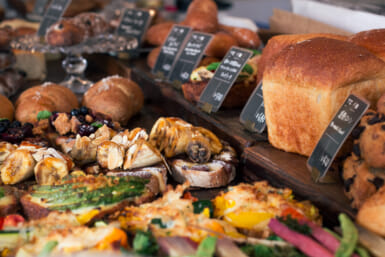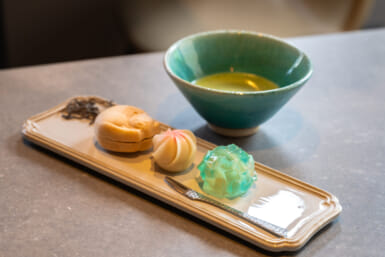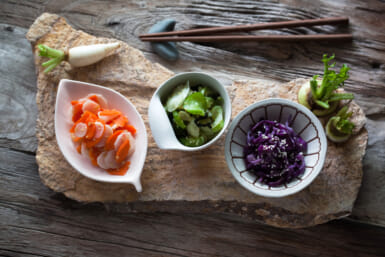by Debbie Marcus
I read recently that the Campbell Soup Company is experiencing a banner year sales-wise due to the bitter cold winter that the United States is presently enduring. People do turn to soup in the cold, cold weather. I turn to Marina Palmer.
Marina and husband Bob, a diplomat with the Canadian Embassy, have lived all over the world and they took advantage of their experiences by becoming involved in the cuisine of each country. Thus the reason for Marina Palmer’s success as an International Cooking teacher in Tokyo.
The goulash soup that Marina makes is guaranteed to warm the cockles of your heart—in fact all your cockles for that matter. She learned how to make this while they were living in London and I’m very grateful that she didn’t leave the recipe there when she left. Otherwise we’d always be without
GOULASH SOUP
1 lb (450 g) lean beef, cut into small pieces
1 Tbsp butter
1 Tbsp olive oil
1 large onion, chopped
2 Tbsp flour
1 Tbsp Hungarian paprika
1/4 tsp marjoram
1/2 tsp caraway seed
1 clove garlic, crushed
14 oz tin tomatoes
1 tsp tomato puree
3 cups beef stock
1 lb (450 g) potatoes, peeled and cut into small cubes
1 green pepper, chopped
Lemon juice
Sour cream (optional)
Salt and pepper to taste
Make sure the meat is cut into small pieces. Heat the butter and oil in a large pan and fry the meat in it over high heat until well browned. Lower the heat, stir in the onion and cook until lightly browned. Sprinkle in the flour, paprika, marjoram, caraway seeds and garlic. Stir well and cook for a minute or two before adding the tomatoes and stock.
When mixture starts to simmer, cover and let simmer very gently for 45 minutes. Take off cover and stir in the tomato puree, then the potatoes and chopped green pepper. Simmer gently, uncovered for a further 30 minutes, stirring occasionally. Add salt and pepper to taste and a squeeze of lemon juice. Put into serving dishes and float about one tablespoon of sour cream on top (optional).
Serves 4-6.
* * *
London was indeed very good to the Palmers. One evening they were attending a very fancy dinner party. After the guests had been served the dessert course, the hostess asked if anyone could guess what was in the pie they had just been served. All agreed it was one of the best pies they had ever eaten, but no one could identify the main ingredient. Imagine the shock when the hostess announced that the pie was made with 20 Ritz crackers.
You don’t have to live in London to make this pie but you definitely do have to have 20 Ritz crackers.
WALNUT MERINGUE PIE
3 egg whites, beaten stiff
1 cup sugar
2/3 cup broken walnuts
1 tsp vanilla
20 Ritz crackers, broken
1 tsp baking powder
1/2 pint whipping cream
To the beaten egg whites, add sugar, nuts, vanilla, baking powder and crackers. Mix. Bake in 9-inch buttered glass pie plate at 325°F (165°C) for 25 minutes. Cool at least 2 hours. Frost with whipped cream and decorate with walnut halves.
* * *
Bob and Marina are from the Toronto area and the most popular fish chowder in their family hails from the maritime or eastern coast of Canada. You can use any firm-fleshed fish for this chowder and for a really good rich flavor, Marina adds some smoked fish (just a small chunk will do). A few pieces of smoked salmon is really good.
I think you’ll agree that there’s nothing “fishy” about Marina’s
FISH CHOWDER
2 cups milk or one cup milk/one cup cream
450g (1 lb) fish filets (tara is in season now), cut into bite-sized pieces
2 Tbsp butter
1 medium onion, sliced
1/2 cup diced celery
2 cups diced potatoes
1/2 cup sliced carrots
2 cups boiling water and 1 cube of chicken bouillon
1 tsp salt
1/4 tsp Hickory salt if you have some or a piece of smoked fish
Pinch pepper
Melt the 2 tablespoons of butter in a large saucepan. Cook the onion and celery until tender then add the rest of the ingredients. Cover and simmer for 10 minutes or until vegetables are tender. Add fish or fishes and cook for 10 minutes longer.
Add the milk or half and half and reheat, but do not boil. At this point, Marina likes to add some mixed herbs such as Herbs de Provence. Taste before serving. If serving from a soup tureen, sprinkle some chopped spring onions on top. On individual servings do the same. Serves 4 to 6.
* * *
Bob Palmer’s diplomatic career has taken his family to some fascinating corners of the world and one of their favorite assingments was when they were posted to Poland.
Every weekend they would venture out of Warsaw to explore the countryside. Even in winter they picnicked every weekend, finding unforgelable spots in the Zakopani area where you can wander through forests so well manicured one doesn’t even have to stoop while walking under the trees.
Their picnics were pretty unforgetable also. They would lake wide-mouthed thermoses full of hot Polish bigos, a frozen bottle of Wyborowa vodka and crusty bread. The Polish tradition of drinking a small glass of frozen vodka before eating dinner (known as a “rammer” in some circles) is still being observed in the Palmer household today.
Marina is also still making Polish bigos stew which is a super source for winter energy. While living in Poland she used the delicious wild mushrooms for this dish which she and Bob used to hunt for on their weekend forays into the woods. But here in Tokyo the Japanese shiitake is a good substitute, unless you are fortunate enough to have a Polish mushroom source.
BIGOS
1/2 kilo Kielbasa (Polish sausage)
1/2 kilo boneless beef
1/2 kilo boneless pork
1/4 kilo bacon, (a small slab is best) diced
2 large onions, sliced
8 peppercorns
1 bay leaf
Salt and pepper to taste
1 1/2 kilos sauerkraut (the tinned type is fine to use, but fresh sauerkraut is of course the best. Wash the sauerkraut if you think it is too strong)
4 pieces of black dried mushrooms, the largest you can find. Soak mushrooms until soft and then slice.
Put sauerkraut into a large vessel and cover with water. Add peppercorns, bay leaf and sliced mushrooms. Put on to cook with lid slightly off. Cook gently until meats are cooked.
In a frying pan, brown the pork and beef in Crisco or a combination of butter and margarine. Add sliced onions towards the end and brown. Put this mixture into another cooking pot and rinse the frying pan with about 3/4 cup of water and add to the meat mixture. Let these meats cook for about one hour or until meat is tender.
Possibly the pork will be cooked first. Remove the meat, let cool and then cut into good bite-sized pieces. Put the meat back into the pot with the onions. Add this mixture to the sauerkraut mixture. De-rind the sausage if necessary and cut into fourths and add along with the diced bacon to sauerkraut mixture. Mix and let simmer for two or three hours. Season to taste with salt and pepper. Always tastes better the second day. Serves about 8.
Marina likes to serve bigos with new potatoes sprinkled with fresh dill and good crusty hot bread. Also a dollop of sour cream goes very well with this dish. Most important of all, don’t forget the ice-cold vodka!
* * *
Bob Palmer was a professional musician before laying down his trumpet and opting for the life of a career diplomat many years ago. Geared with a musician’s creative temperament, he became a natural with a camera during their posting to Kenya. He was an award-winning photographer of African wildlife, his photos gracing magazines the likes of Leica “Fotografie” and “Swara” which is published by the East African Wildlife Society.
From Nairobi the Palmers safaried to Japan, an easy transition for them as they had lived in Japan in the early 1970s. Since living in Tokyo this time. Bob has temporarily laid his camera to rest. “The only wildlife in Japan is in Roppongi at 2 o’clock in the morning,” he states resignedly.
Soon after he retired his camera, he picked up his horn again, putting an end to 25 years of abstinence—and 25 years of peace and quiet for Marina. Instead of weekends spent wandering through the Masai Mara, Bob can now be seen camping out at the Yamaha Music Store in the Ginza.
A prolific and talented musician can’t be held down for long. Bob is now starting a big band jazz group comprised of non-Japanese men who play an instrument and are as frustrated as he at not being able to hear, sec and be part of that big-band sound. His band is still at the formative stage so anyone who is interested in joining should contact Bob Palmer at the Canadian Embassy (408-2101) or his unofficial manager and part-time roadie, our own Corky Alexander (374-2631).
We all think we lead busy lives in Tokyo — and we do — but Marina must be one of the most sought-after ladies here. At present she is President of the Canadian Women’s Club of Japan, a position that keeps her on the go. Her International Cooking Classes are in demand, leaving her little time to hold the special cooking workshops that she really enjoys giving.
She takes full advantage of the fresh fish one can buy in Tokyo. A big hit with the students in her classes is a fish dish that Marina used to make when she lived in Kenya and has had great success with here using the Japanese red snapper or tai.
FRESH WHOLE RED SNAPPER STUFFED WITH COCONUT & GINGER
1 large whole red snapper (or any whole fresh seafish)
2 Tbsp butter
1 Tbsp chopped tarragon
1 1/2 Tbsp sliced green onion
6 cloves
2 Tbsp shredded fresh ginger
1/2 cup grated coconut
1/2 cup butter
Salt and pepper to taste
Have the fish cleaned and scaled. Place in a greased roasting pan. Season inside with 2 tablespoons of butter, tarragon and onions. Stud the top of the fish with cloves and cover with grated ginger and coconut. Coat the fish with butter and place in a 375°F (190°C) oven. Bake for approximately 40 minutes. Serves 6-8.








